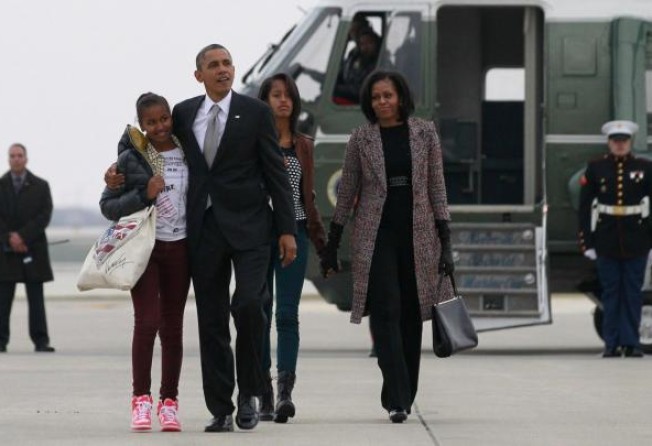
Both sides appear more conciliatory as 'fiscal cliff' deadline looms
Powerbrokers in the House and Senate seek a deal to avert January's 'fiscal cliff' when tax increases and spending cuts come into force

US House of Representatives Speaker John Boehner, striking a conciliatory tone a day after the Republican Party's electoral drubbing, said that he was ready to accept a budget deal that raises federal revenue under the right conditions, to avert the so-called "fiscal cliff" in 52 days.

Boehner's gesture was the most explicit offer he has made to avert the "fiscal cliff" in January, when billions of dollars in tax increases and automatic spending cuts go into force. It came hours after Senator Harry Reid, the Senate Democratic leader, offered his own olive branch, saying "it's better to dance than to fight".
"Mr President, this is your moment," Boehner told reporters in the Capitol. "We're ready to lead, not as Democrats or Republicans, but as Americans."
The offer may be enough to bring the parties to the table after an election that kept President Barack Obama in power, tightened the Democrats' grip on the Senate and chipped away at the Republican House majority.
But Democrats and Republicans are still far apart. Boehner made it clear that his vision for additional revenue includes a tax code that lowers even the top income tax rate from where it is now, 35 per cent, not where it would be in January when the Bush-era tax cuts are set to expire - 39.6 per cent. At least some of that additional revenue would come from economic growth that he said would be fuelled by a simpler tax code.
Senator Charles Schumer of New York, the third-ranking Democrat, has said those constructs are unacceptable. Democratic leaders say tax reform that lowers tax rates across the board would either hurt the middle class by trimming vital tax benefits like the home mortgage deduction or would not raise enough taxes to meaningfully reduce the deficit. Reid underscored Obama's contention that tax rates on the rich must rise, saying most Americans supported that, "including rich people".
But in language and timing, the leaders of Congress' two chambers left the unmistakable impression that they want a deal large enough to avert the worst economic impacts of a sudden rise in income, payroll, capital gains, dividend, interest and estate tax rates that would affect virtually every American family.
Obama enters the next fray with heightened leverage, both sides agree, especially on what he sees as the most immediate issue: Whether Republicans will relent and extend the Bush-era income tax cuts, which expire on December 31, except for households with taxable income above US$250,000 a year.
Yet if Obama received a mandate for anything after a campaign in which he was vague on second-term prescriptions, it was his proposition that the wealthiest Americans like himself and Mitt Romney should pay higher income taxes. That stance was a staple of Obama's campaign speeches for more than a year. Voters surveyed after the polls overwhelmingly agreed.
"This election tells us a lot about the political wisdom of defending tax cuts for the wealthy at the expense of everything else," a senior official said.
Much speculation held that a result like what occurred - maintaining the status quo with Obama in the White House; Democrats in control of the Senate, though now with an unexpectedly padded majority; and Republicans leading the House - would make for continued gridlock and a fall off the fiscal cliff at some cost to the recovery.
In his congratulatory statement to Obama on Wednesday, the Senate Republican leader Mitch McConnell said: "It's time for the president to propose solutions that actually have a chance of passing the Republican-controlled House of Representatives and a closely divided Senate."
Reid, his hand strengthened somewhat, said: "I am going to do anything in my power to be as conciliatory as possible."
'Fiscal cliff' looms on January 1
What is the fiscal cliff?
The term is shorthand used to describe the situation on January 1 next year, when several tax breaks will end and public-sector spending cuts will hit the US economy unless a new budget deal is approved. Among the changes are the cancellation of a 2 per cent cut in payroll tax introduced last year. Tax breaks for businesses that George W. Bush passed in 2003 have allowed big write-offs on new equipment. Individuals making more than US$388,350 a year will see a 4.6 percentage point rise in income tax to 39.6 per cent.
What about spending cuts?
About US$108 billion of cuts to departmental spending will kick in. Most of the heavy lifting on cuts has so far been carried by local government and individual states. Now it will be the turn of the federal government.
What is the impact of the cuts?
The financial effect tends to be overstated because it will be spread over the whole year. In that sense, the use of the word cliff is misplaced. But the potential loss of confidence in the US economy and government may be catastrophic if politicians fail to make progress next month.
How has the market reacted?
Markets had dismissed the significance of the fiscal cliff as traders did not believe US politicians would kill the economy next year. But some blamed the status-quo election for big falls on US markets on Wednesday.
Is a deal likely?
Republicans have defended the Bush tax breaks for the better off, but given Barack Obama's re-election victory, they are likely to concede ground if they can protect some business tax reliefs.
The Guardian